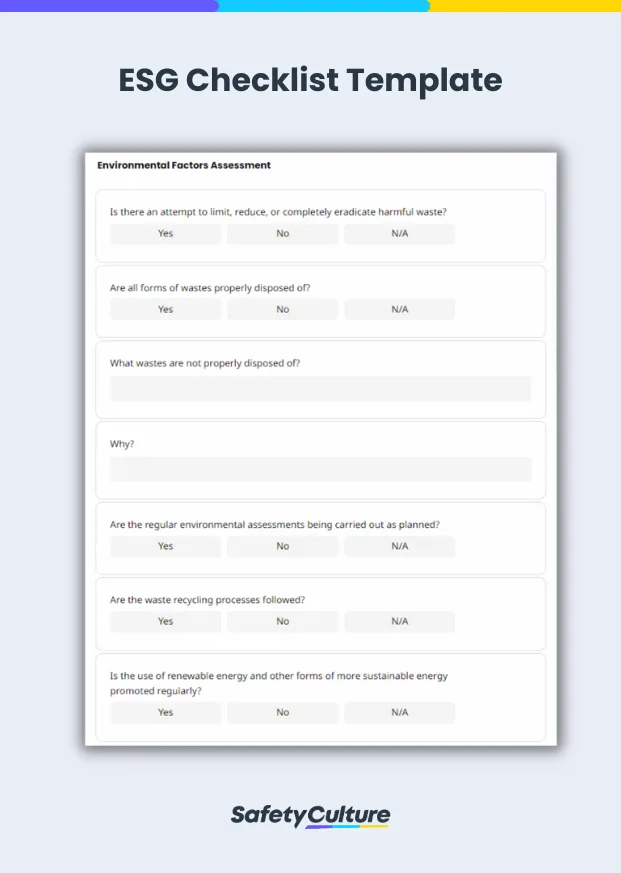Published 2 Oct 2025
Article by
4 min read
What is an ESG Checklist?
An ESG checklist is meant to help assess a company’s sustainability by checking its Environmental, Social, and Governance (ESG) practices and regulations. Also known as an ESG due diligence checklist or ESG compliance checklist, this checklist can be used by Corporate Social Responsibility (CSR) managers, fund managers, investors, and anyone who wants to assess a company’s leadership and general management.
Importance
As the definition of what is considered fair and ethical may differ per situation, having ESG criteria can help put things into perspective. This set of criteria is thus the standards for a company’s behavior and actions and can help socially conscious managers and investors to screen potential investments and other opportunities.
Having an ESG checklist is essential in performing an ESG assessment. Performing an ESG assessment is an important part of improving ESG policies and practices, as it gives an idea of what actions are beneficial to the company and what isn’t.
ESG criteria also encourage employees to act more responsibly and consciously of their environment. Having a checklist will not only remind them of it but also encourage them to report any problems they may encounter during their assessment. A digital checklist, in particular, is beneficial as it can be used anywhere on the go.
An ESG checklist can also serve as an official document. Managers and investors can use a digital templated ESG checklist or create one themselves, store it in a cloud, and easily access it later for further discussions on a company’s ESG practices.
Key Components of an ESG Checklist
The key components of an ESG checklist covers the three pillars of Environmental, Social, and Governance factors.
Environmental: Evaluate environmental impact by assessing pollution control, waste management (disposal, recycling, harmful waste minimization), and resource management (carbon emissions, energy/water consumption, renewable energy). Review ecological impact, including biodiversity, land use, and climate change strategies.
Social: Review fair wages, benefits, workplace conditions, and employee satisfaction. Assess CSR activities, community engagement, and human rights protection.
Governance: Evaluate leadership, management transparency, data protection for employees and clients, financial disclosures, tax transparency, reporting accuracy, risk assessment, crisis management, ethical business practices, board diversity, and corporate ethics.
How to Make Your Own ESG Checklist
Each ESG checklist will be different based on the standards set by a company and their respective values. However, generally, an ESG checklist aims to analyze a company’s environmental impact, social responsibility, and the status of its governance or leadership.
Ideally, there will be a section for each aspect of ESG, along with guide questions or points of consideration to help the manager or investor assess the company.
For the environmental factor, managers and investors observe the company’s impact on its environment. Is the company:
Properly disposing of its land, air, and water waste?
Consciously trying to limit its harmful waste?
Constantly conducting an assessment on its environmental impact?
Regularly promoting the use of renewable or more sustainable forms of energy?
Recycling its waste or energy?
Similarly, the social factor is related to the company’s environment. Specifically, this factor aims to analyze the company’s relationship with its employees and others in society. Is the company:
Open to employing anyone, giving everyone equal opportunities to be hired?
Encourages diversity in the workplace in terms of class, beliefs, race, gender, and sexuality?
Fair in paying its employees’ wages?
Prepared to sanction any offenses?
Active in doing CSR work?
The governance factor pertains to the system of leadership and management in the company. Is the company:
Actively protecting the data of its employees and clients equally?
Regularly disclosing reports on expenditures, company initiatives, and other related tasks to employees and other stakeholders?
Transparently disclosing where taxes go?
Regularly conducting risk assessments and creating or maintaining crisis management plans?



